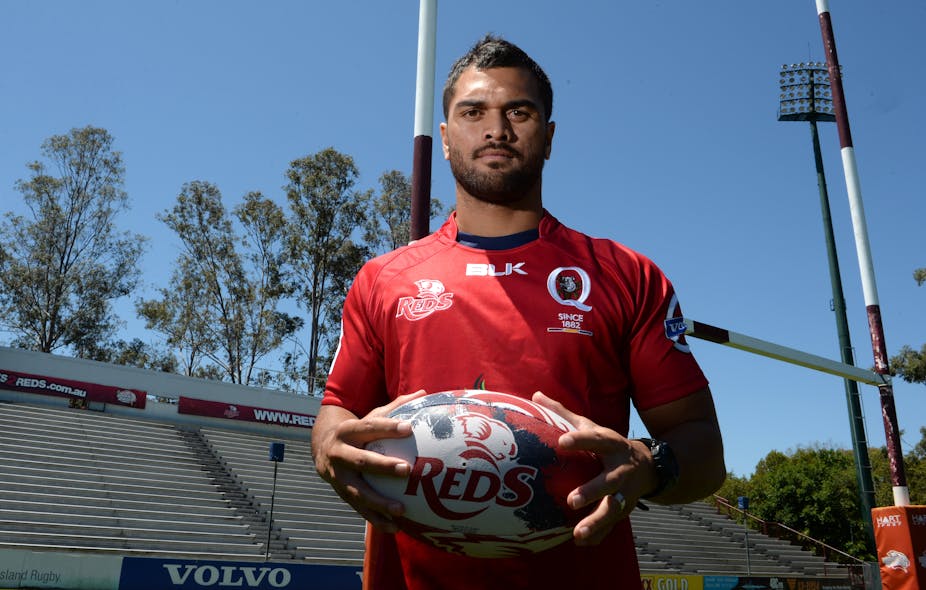Five Gold Coast Titans rugby league players and Queensland Reds rugby union player Karmichael Hunt have been stood down after they were charged over allegations related to drug supply offences. The move raises the question of the extent to which clubs ought to sanction professional athletes before a court has dealt with allegations of illegal behaviour.
The contracts of professional footballers include moral clauses. These require that players not bring their game into disrepute or engage in activity – including but not limited to illegal activity – that would discredit not only their game, but also their club, their team, club sponsors and suppliers.
The scope of such clauses is both remarkably general and extensive. Rather than attempting to specifically identify disreputable activity, the clauses constitute powerful legal devices that operate to ensure that a player’s activity on and off the field is always reputable.
The implication is that players have a contractual obligation to act as moral exemplars or role models. That is an implication challenged by recent research, which argues that such clauses infringe players’ rights to privacy and to the presumption of innocence.
However, rugby union player Stephen Hoiles – and famously NBA basketballer Karl Malone before him – have argued that the high salaries professional athletes earn are accompanied by responsibilities. These are responsibilities acquired by virtue of their capacities.
Malone’s view is that professional athletes do not have a choice as to whether they are role models. Rather, others choose them. With regard to product endorsements, athletes create obligations for themselves.
Consequently, they ought not to accept the adulation and the money without accepting some responsibility for some people following their lead and buying a certain sneaker or cereal because they use it. There is an obvious tension here between views of players’ rights under employment contracts and their responsibilities – both ethically and contractually.
The question raised by the situation facing the athletes in Queensland, and numerous analogous situations of illegal or anti-social behaviour by players, relates to the extent of a player’s off-field responsibility. Contractual considerations aside, can a player’s responsibility to behave in a reputable manner reasonably be extended to all aspects of his or her off-field life? If so, then the players’ understandings of the nature or set of their responsibilities are crucial.
It is possible that players might regard their high salaries and product endorsement fees as justified recompense for the level of their talent, skill and dedication. They may fail to appreciate that the benefits product endorsements bring are built on relationships established with those (possibly young and impressionable) people influenced by their fame.
Personal, social and environmental factors will affect players’ perceptions of their roles as professional athletes and their motivation as players. In turn, this shapes their understanding of the significance of the general and extensive moral clauses in their contracts.

While adults must be held responsible for their behaviour, given that research indicates a correlation between anti-social behaviour and ego-involving environments, the kinds of anti-social transgressions that have occurred are not surprising. When we look at the environments in which professional athletes operate we find a volatile mix of fame, free time and spare cash. That is unlikely to reinforce the notion of moral identity.
Beyond this, two other potentially related factors may have an impact on the development of moral understanding among professional athletes.
First, research in the United States focusing on the moral reasoning capacity of college athletes has suggested that, by comparison with their non-athletic peers, college athletes displayed a lower level of moral reasoning in relation to a set of standard moral dilemmas.
Researchers argue that a transformed notion of reasoning – what they refer to as “game reasoning” – occurs in sport. They evaluated the non-athletes’ moral reasoning as more mature than that of the athletes. Further, the athletes’ reasoning in response to sport-specific dilemmas was rated as less mature or adequate than their corresponding reasoning about everyday life.
Second, the question of responsibility within the context of sport is also fraught. This is due to our ambivalence about sport and the moral implications of its relationship to aggression.
We value sport as a form of play, an avenue of social and moral development, a character-building activity. However, these ideals are somewhat paradoxically juxtaposed to attitudes toward professional sport such as that expressed by commentator Phil Gould, who said of rugby league in 2013:
How can anyone think that sanitising a product built on all-out aggression will improve its appeal? This is poor analysis.
While the public and sporting clubs justifiably expect professional footballers to respect and be subject to the law, we ought to recognise that some players are ill-prepared to take on the status of a role-model both on and off the field. That does have a bearing on the extent to which we can reasonably expect professional athletes to be moral exemplars.

